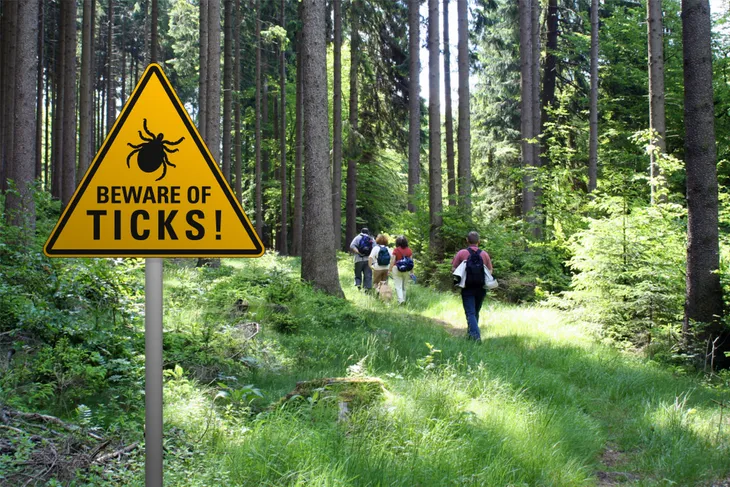You never know what you’ll encounter when you step outside. From small mammals and birds to reptiles and beyond, Mother Nature has some critters to look out for. One type of insect that should be on your radar is chiggers. Chiggers are pesky little bugs that can creep up on you when you least expect it, bite the skin and leave you with some not-so-pleasant symptoms.
What Exactly Are Chiggers?
Located in tall weeds, grass, berry patches, and wooded areas, chiggers are a type of larvae that will bite you if given the opportunity. They are sometimes called red bugs and are so small that you might not even see them when you’re out and about.
According to Healthline, chiggers are most active when temperatures are warm. This means they tend to thrive in the spring, summer, and fall afternoons. They eventually become inactive once the weather falls below 60-degrees Fahrenheit (16-degrees Celsius) and then they completely vanish at temperatures below 42-degrees Fahrenheit (6-degrees Celsius).
Chigger Bites
When chiggers bite, they latch onto the surface of the skin. They want to stay there for as long as they can with a pretty gross goal. According to Very Well Health, chiggers inject saliva into the skin which contains enzymes. These enzymes liquefy the skin cells and the chiggers suck out the liquid.
Chigger larvae tend to go for thinner skin in areas where it folds because they have small mouths. Two prime areas for the chiggers to attack are the armpits and groin. Since they are so small, you may not even be aware that chiggers are attached to the skin until you experience symptoms.
Symptoms of Chigger Bites
Although chiggers are no bigger than 1-millimeter long, their bites pack a serious punch. The most common symptom is pronounced itching which can be really uncomfortable, especially if you’re going on a long hike or activity.
The area where the bite occurred may appear red, flat, or raised like blisters or hives. It’s also common to be bitten by more than one which may cause the bites to appear in groups.
Why Are the Bites Itchy?
Medicine Net says the itchiness occurs due to the presence of stylostome. This is a feeding tube formation allowing chigger larvae to feed upon the destroyed tissue.
Itching can last for several days which may keep you up at night. So, it’s important that you get the itchiness under control. Finally, it may take up to 2-weeks for lesions on the skin to fully heal.
Possible Complications
Itching is something you’ll have to deal with after getting a chigger bite, but there is potential for other complications to occur. WebMD warns that men who get bitten in the groin area could end up developing a condition that causes swelling, itching, and difficulty urinating.
The good news is that chiggers are not the type of insect to spread diseases. Persistent scratching could cause an open wound and trigger irritation or infection, which should be treatable from home. Just make sure to see a doctor if you get bitten internationally. Chiggers can spread scrub typhus in Asia.
Treating Chigger Bites at Home
For those who end up getting bit by a chigger, there are some remedies you can easily do at home. Start by taking a bath or shower to scrub away any chiggers that remain on the body. To stop yourself from itching, Medical News Today says to apply ice to the area to relieve the desire.
If ice isn’t working, you can also pick up an over-the-counter anti-itch medication at the drugstore. Look for hydrocortisone cream or calamine lotion on shelves. Another option is to take diphenhydramine (Benadryl) to relieve the itching.
When to See a Doctor
The good news is, you should recover within a couple of weeks. However, if your symptoms persist, schedule an appointment with your doctor.
In rare cases, they may prescribe steroid shots to treat itching and swollenness. Some patients who develop an infection may be given antibiotics.
Preventing Chigger Bites
Whenever you go out on a hike or even just venture to your backyard, you’re at risk of getting bitten by a chigger (except for in the winter). Luckily, there are some easy precautions you can take to prevent getting bitten by a chigger.
As you get ready for a day outdoors, cover the skin as much as you can. This includes wearing long sleeves, tall socks, and other layers to limit your skin exposure. If you can’t completely cover up, spray on some bug spray to repel chiggers. Finally, take a shower once you’re back home to get rid of any stranglers that may have attached to you.
More Prevention Methods
There are more ways to prevent these dreaded bug bites! Stick to designated pathways when adventuring outdoors. You’re more likely to encounter chiggers in areas full of vegetation that brushes your legs.
Further, opt for sunny areas where they’re less likely to be. If long grassy areas can’t be avoided, brush off your body with your hands every 30-minutes. This can help knock off any chiggers that may have found you.
How to Combat Infestations at Home
Hiking in the woods isn’t the only place you have to worry about chiggers. They can roam in your backyard too. To combat chigger infestations at home, make sure to:
- Keep the grass mowed
- Pull weeds
- Look for lawn care insecticides
- Wash your clothes whenever you’re outside during chigger season
Chiggers on Pets
Humans are not the only ones that can fall victim to chiggers. Your pet could also end up getting bitten if they go outdoors. These bugs could end up in your cat and dog’s ears, leading them to scratch and feel irritated.
Luckily, the experts at Orkin say that humans cannot get chiggers from contact with their pets. It simply means that your pet was in an area where both of you were exposed and your pet fell victim. Give them a thorough cleaning and contact the veterinarian for treatment advice.
Beware of Other Bug Bites
There are plenty of different bugs you may encounter upon stepping outside. And if you’re someone who likes to go in wooded areas or vegetative areas where they linger, it’s good to know what else to be on the lookout for. Here are some other common bugs that bite and what they can lead to:
- Ticks: feed on blood and can cause Lyme disease.
- Mosquitoes: suck on blood leading to small, puffy bumps that itch.
- Spiders: can mark the skin with tiny punctures that cause mild pain.
- Fleas: bite the skin, often your pets, leading to red bumps.
- Ants: can bite or sting which causes inflammation and pain.















